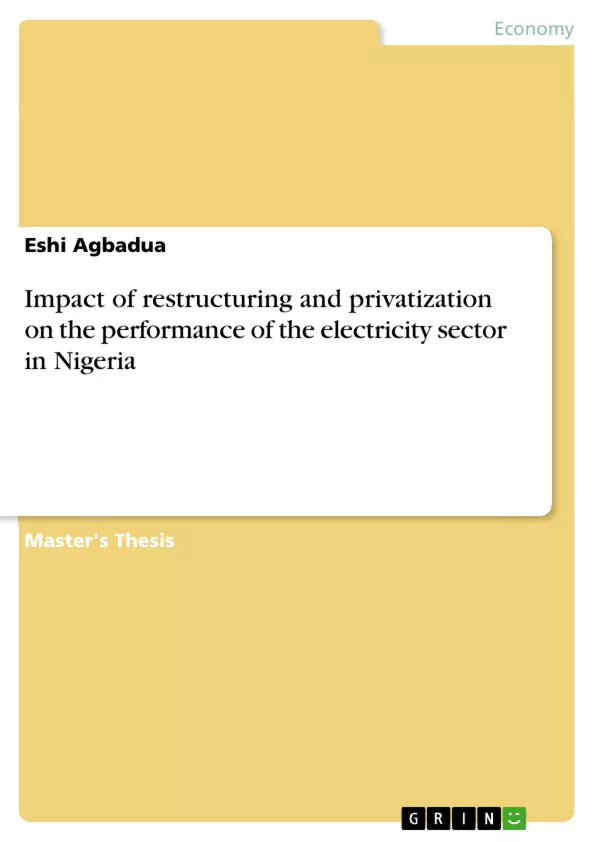The slow and deteriorating performance of the electricity power sector over the last few decades triggered the Federal Government of Nigeria to embark on a power sector reform program. This study examines the impact of the power sector reform (restructuring and privatization) on the performance of the electricity sector in Nigeria over the past twenty-five (25) years. Relevant electricity indicators are used to access the performance changes in three significant period; pure state-ownership, transition (restructuring and unbundling) and full privatization of the sector.
The study also assesses how the effect of the economic environment, regulatory governance and political climate/effectiveness within the period contributes to the improvements in the electricity sector. The results shows that privatization is associated with improvement in the technical efficiency, access to electricity, electricity consumption per capita and an increase in electricity tariff in the sector. Furthermore, the results highlight the significant relationship between regulatory governance and a robust economy on the performance changes observed in the power industry.
Inhaltsverzeichnis (Table of Contents)
- CHAPTER ONE INTRODUCTION
- 1.1 Background of the Study
- 1.2 Justification for the study
- 1.3 Project Objectives
- CHAPTER TWO BACKGROUND OF PRIVATIZATION IN NIGERIA
- 2.1 HISTORY OF PRIVATIZATION IN NIGERIA
- 2.2 OVERVIEW OF ELECTRICITY SECTOR IN NIGERIA
- 2.3 THE PRIVATIZATION PROCESS AND SUCCESSOR COMPANIES
- 2.4 CHALLENGES AFTER PRIVATIZATION OF THE ELECTRICITY SECTOR
- CHAPTER THREE LITERATURE REVIEW
- 3.1 Privatization, Economic Reforms and Performance
- 3.2 Empirical Literature
- 3.3 Research in Nigeria
- CHAPTER FOUR RESEARCH METHODOLOGY AND DATA
- 4.1 DATA
- 4.2 METHODOLOGY
- CHAPTER FIVE RESULTS AND DISCUSSIONS
- 5.1 PRESENTATION OF RESULTS
- 5.2 DISCUSSION
- 5.3 LIMITATION OF THE STUDY
- CHAPTER SIX CONCLUSION
- 6.1 RECOMMENDATIONS
Zielsetzung und Themenschwerpunkte (Objectives and Key Themes)
This study aims to evaluate the influence of the electricity sector reform program, encompassing restructuring and privatization, on the performance of Nigeria's electricity sector over the past 25 years. The research utilizes pertinent electricity indicators to assess performance changes across three distinct periods: pure state-ownership, transition (restructuring and unbundling), and full privatization of the sector.
- Impact of privatization on the performance of the electricity sector in Nigeria
- Assessment of performance changes in the electricity sector across different ownership models
- Role of the economic environment, regulatory governance, and political climate on electricity sector performance
- Relationship between regulatory governance and a robust economy on the performance changes observed in the power industry
- Analysis of technical efficiency, access to electricity, electricity consumption per capita, and electricity tariff changes
Zusammenfassung der Kapitel (Chapter Summaries)
Chapter One: Introduction
This chapter provides the background of the study by discussing the global trend of privatization and its impact on economic reform. It examines the rationale behind privatization programs, including their intended benefits such as increased revenue, market competition, public share ownership, and economic development. The chapter further highlights the mixed results of privatization in Africa, with examples of countries that have experienced both positive and negative outcomes.
Chapter Two: Background of Privatization in Nigeria
This chapter delves into the history of privatization in Nigeria, tracing its evolution and significance in the country's economic reform agenda. It provides an overview of the Nigerian electricity sector, outlining its structure, challenges, and the privatization process that led to the formation of successor companies. The chapter concludes by examining the challenges faced by the electricity sector post-privatization.
Chapter Three: Literature Review
This chapter presents a comprehensive literature review on the relationship between privatization, economic reforms, and performance. It examines existing empirical literature on the subject, focusing on studies that have investigated the impact of privatization on economic performance. Additionally, the chapter analyzes research conducted in Nigeria, exploring the context-specific challenges and opportunities related to privatization in the country's electricity sector.
Chapter Four: Research Methodology and Data
This chapter outlines the research methodology employed in the study, including the data sources used and the analytical techniques applied. It provides details on the data collection methods and the specific indicators used to measure the performance of the electricity sector.
Chapter Five: Results and Discussions
This chapter presents the findings of the study, analyzing the results of the data analysis. It discusses the impact of privatization on various performance indicators of the electricity sector, such as technical efficiency, access to electricity, electricity consumption per capita, and electricity tariff. The chapter also explores the relationship between regulatory governance, economic environment, and the observed performance changes.
Schlüsselwörter (Keywords)
This study focuses on the impact of privatization and restructuring on the performance of the electricity sector in Nigeria. Key terms include: privatization, restructuring, electricity sector, performance, economic reform, regulatory governance, technical efficiency, access to electricity, electricity consumption per capita, electricity tariff, and empirical research.
- Quote paper
- Eshi Agbadua (Author), 2015, Impact of restructuring and privatization on the performance of the electricity sector in Nigeria, Munich, GRIN Verlag, https://www.grin.com/document/353796



